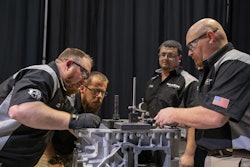
An effective call center can help expedite repairs and even get in front of a customer’s vehicle issues.

By having some form of easy-to-reach and effective service call center, service providers can be that reliable partner. By diagnosing the problem over the air, locating a nearby dealership or aftermarket repair shop, helping a stranded driver or by providing other types of assistance, service providers can streamline their customers’ repair process.
A service call center gets trucks back on the road more quickly and strengthens the bond between the provider and its customers. There’s more than one way to operate an effective service call center. Several companies have developed different methods to support their customers with much success.
Providing support
To streamline the customer repair process for its customers, Four Star Freightliner uses the Detroit Connect Virtual Technician, which is a remote diagnostic system for Freightliner and Western Star trucks equipped with Detroit engines designed to help truck owners make informed service decisions within minutes of an engine or aftertreatment concern.
“We keep our customers’ trucks on file and get a notice that the vehicle has an issue. This gives us a head start on getting in front of the process,” says Jerry Kocan, dealer principal, Four Star Freightliner. “We then notify our fellow dealer service personnel that we have a customer truck headed to them and let them know what the issue may be or what the error code is on the truck.”
Kocan says the program, which was implemented approximately three years ago, has been very successful and has made the dealership an “asset and better partner to our customers and separates us from our competition.”
Director of Customer Service Jim Taylor says Truckworx Kenworth’s fleet support program uses a combination of telematics, a service relationship management (SRM) system and relationships between its fleet representatives and customers to quickly facilitate repairs.
“There’s not a single software out there that provides our customers with the level of support they expect. We believe it’s a relationship and it’s hard work,” Taylor says. “We’re using the telematics Kenworth provides, Decisiv’s [SRM] and the relationships we have with our customers so they know we’re doing everything we can for them.”
Using Kenworth’s TruckTech+ telematics, Truckworx can monitor the location of the truck, mileage and fault codes “so we know what’s going on with a truck before it gets to the dealership,” he says.
Taylor adds, “In the past, we found that customers were getting frustrated with a lack of communication.” To combat that, Truckworx implemented the Decisiv SRM to streamline communication between the customer, the service technician and the service writers.
The company also maintains relationships with other dealer groups around the country, which helps expedite a customer’s repairs wherever that truck might be. “Kenworth has really good communication within its own dealer network,” Taylor says.
In addition, the Truckworx concierge program monitors connected customer vehicles and works with vehicle owners and drivers to schedule service appointments to reduce unscheduled downtime.
 The combination of highly trained dispatch agents with the support of TA Truck Service RoadSquad’s technician hotline has proven to be successful.
The combination of highly trained dispatch agents with the support of TA Truck Service RoadSquad’s technician hotline has proven to be successful.Katie Scott, customer service manager, Summit Truck Group, practically bristles at the concept of a call center.
“We feel it is almost obsolete with technology today. Nobody is wanting to pick up the phone. They want someone to give them the information before they ask for it and that’s what we strive to do at Summit,” she says.
“We try to find out everything that’s needed for customers to make an educated decision on a repair. We find out what the problem is, where the truck is going, how long the repair is going to be and give that information to the customer prior to them asking.”
Relying heavily on Navistar OnCommand Connection telematics, Summit tracks fault codes in real time to see what is happening with customers’ trucks and alerts the fleet manager if there’s an issue. Summit will inform the customer of which repair shops are located in the truck’s vicinity. Summit will then contact the repairing dealer, whether it’s a Summit location or outside of the Summit network, and facilitate communication between itself, the customer and the repairing dealer.
The program started in 2014 with a fleet of 800 trucks and Scott handling the operation in what was initially to be a part-time, temporary position. Over a year later, Summit built its central support office in Lewisville, Texas, and Scott heads up the customer service department that now supports 50,000 trucks.
“The program works because customers feel they have somebody to rely on. They know somebody on the call has information for them or will give them an avenue to get the information they need,” Scott says. “We run a pretty lean ship so we’re able to provide that personal relationship with all of our customers.”
Service call centers and their ability to streamline the repair process are especially important when trucks are stranded on the side of the road.
TravelCenters of America’s TA Truck Service RoadSquad says its focus is on helping drivers get back on the road safely and quickly.
“Our call center agents help ensure technicians are prepared by asking drivers a series of questions in order to understand the nature of the breakdown. If a fleet dispatcher calls in the breakdown, we gather the information from them and then reach out to the driver to verify their location and breakdown details provided by the fleet representative,” says Sandra Sanford, vice president, TA Truck Service RoadSquad.
If a technician needs further support on-site, the program includes a technician hotline staffed with ASE Master Technicians who are available at any time to answer questions.
“Their input is invaluable and helps ensure the right tools and parts are being brought to the site,” Sanford says.
Good service is good for business
A call center that expedites repairs reduces vehicle downtime and builds confidence customers have with providers, which could lead to repeat business. However, experts add certain elements are needed to build an effective call center.
Scott says the service Summit provides helps customers by creating transparency in the repair process.
“There’s no more guesswork for them. They’re not having to pretend to be the technician. They have all their options in front of them,” she says.
The use of OnCommand Connection has opened up opportunities for the dealership’s parts and service departments beyond informing customers of fault codes and providing them with assistance.
“Our service departments are now reaching out to the customers and saying, ‘Hey, did you know there’s a recall that affects you? When would be the best time to schedule you?’” Scott says. “We’re making that relationship with the customer solid. We’re letting them know we’re not there for the initial sale of their vehicle. We’re there for everything that truck needs for the life of the vehicle.”
Oftentimes, customers will need to take their vehicle to a dealership different from the one they’re accustomed to going to. Truckworx’s fleet support program gives them an advocate that understands the dealer network, “so you feel like you have someone on the inside, someone who has your back,” Taylor says.
He adds Truckworx representatives use their knowledge of dealership service departments, warranties, billing and parts logistics, and other aspects of the repair to assist their customers.
“Ultimately, our goal is to do the right things for the right reasons for our customers. You have to put yourself in the business owners’ position to know how to best help them,” he says.
 Truckworx Kenworth’s fleet support program uses telematics, a service relationship management system and relationships between its fleet representatives and customers to facilitate repairs.
Truckworx Kenworth’s fleet support program uses telematics, a service relationship management system and relationships between its fleet representatives and customers to facilitate repairs.Taylor adds he has seen an increase in return sales since starting the program. “Customers are comfortable with the support they’re getting and it makes their decision easier when it comes time to buy trucks again.”
The service call center process “helps customers because we provide a level of expertise and knowledge they may not have in their company. It works best when you and your customers set the expectations from the beginning and communicate all of the way through the process,” Kocan says.
“It also helps Four Star understand our customers’ business better, which makes us better prepared to support them,” he says. “The key is transforming your local customers into your fellow dealers’ customers as well.”
Sanford says the combination of highly trained dispatch agents with the support of TA Truck Service RoadSquad’s technician hotline has proven to be successful.
“The number of fleets, both large and small, who trust us with their business has grown exponentially within the last five years,” she says.
In developing an effective and efficient service call center, a few key essentials top the list for successful providers: communication and a knowledgeable and caring staff eager to help.
“The important factors when considering developing a program like this is to have a knowledgeable individual managing and communicating with your customers, then developing a system so your customers know what to do when they have a challenge. Communication is key,” Kocan says.
“If you have an experienced service person managing the process, you can sometimes diagnose the problem from the Virtual Technician connection so it assists in minimizing down time for the customer,” he adds.
Critical to the success of TA Truck Service RoadSquad and the service it provides is communication and teamwork among customers, call center agents, TA Truck Service locations and technicians and its third-party network.
“Having a sophisticated mapping tool and the right systems to capture and monitor information are instrumental but, most importantly, it’s having engaged people. You can train someone to answer a phone or to ask the right questions, but our most successful agents are the ones who truly care about the people they are speaking to on the phone,” Sanford says.










